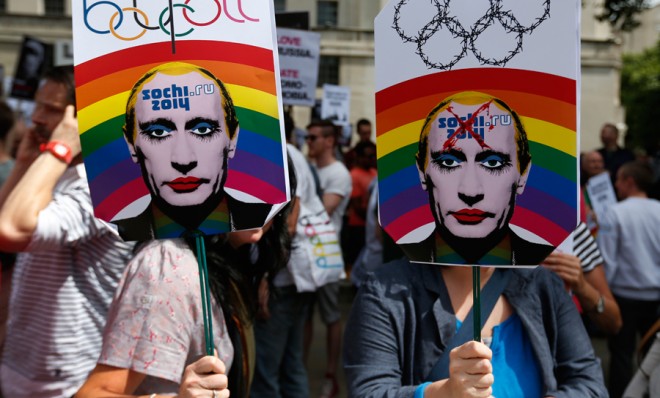3 reasons not to boycott the Olympics over Russia's anti-gay law
There are better ways to fight for gay rights


A free daily email with the biggest news stories of the day – and the best features from TheWeek.com
You are now subscribed
Your newsletter sign-up was successful
Outraged civil rights activists are urging the U.S. and other nations to boycott the Winter Olympics in Sochi, Russia, next year to protest Moscow's sweeping new anti-gay law, which bans homosexual "propaganda." However, both President Obama and British Prime Minister David Cameron have rejected the idea.
Obama says he's offended by the Russian law, but doesn't think it's appropriate to tell hard-working athletes that they can't go to the Games. "One of the things I’m really looking forward to," Obama said at a press conference last week, "is maybe some gay and lesbian athletes bringing home the gold or silver or bronze, which I think would go a long way in rejecting the kind of attitudes that we're seeing there."
Russian leaders have assured the International Olympic Committee that visiting athletes and spectators won't be affected by the law. The IOC would naturally be loath to cancel the Games, but IOC President Jacques Rogge has pointedly reminded us that the Games' charter states unambiguously that the Olympics must be "open to all, free of discrimination."
The Week
Escape your echo chamber. Get the facts behind the news, plus analysis from multiple perspectives.

Sign up for The Week's Free Newsletters
From our morning news briefing to a weekly Good News Newsletter, get the best of The Week delivered directly to your inbox.
From our morning news briefing to a weekly Good News Newsletter, get the best of The Week delivered directly to your inbox.
Here are three reasons why a boycott might not be the best way to protest Russia's anti-gay law:
1. Olympic boycotts don't work
"Russia's new law is horrific, as is the country's repeated failure to protect its gay citizens from beatings, torture and killings," says Christian Schneider at the Milwaukee Journal Sentinel. "But as we've seen in the past, Olympic boycotts rarely achieve their stated goals."
President Jimmy Carter, for example, pushed a boycott of the Summer Olympics in Moscow in 1980 to pressure the Soviet Union to withdraw from Afghanistan, but the soldiers stayed for another decade. The only concrete impact came four years later, when the Soviet Union retaliated by staying away from the 1984 Olympics in Los Angeles.
A free daily email with the biggest news stories of the day – and the best features from TheWeek.com
Furthermore, a boycott could make life worse for Russia's LGBT community, "as they could be scapegoated for a diminished event," says Schneider.
2. Athletes, not Russia, would be punished
"Like boycotting a British-owned vodka because it has a Russian name," says Cyd Zeigler at MSNBC, "nations choosing to stay home for the Olympics only hurt hard-working young athletes, not Vladimir Putin."
Indeed, punishing Russia directly is an option for the IOC. "The IOC must ban Russia from participating in these Olympics so long as it is in clear violation of the Olympic Charter," says Zeigler.
3. The world would miss a chance to celebrate gay pride
Not all gay-rights activists favor a boycott. Some say the better alternative is making sure that the Sochi Games are the "gayest Olympics ever." If gay athletes are willing to compete in Russia, says Elizabeth Plank at Policymic, the rest of the world should focus on cheering them on, to show support and ensure their safety in a country where waving a rainbow flag can now get you arrested.
"Won't a gay athlete literally wearing pride on his sleeve send a more powerful message than stopping him from participating in the competition in the first place?" Plank asks.
Just as Jesse Owens embarrassed Adolf Hitler by winning four gold medals in Berlin's 1936 Games, "a rainbow flag-wearing snowboarder from the United States" would send the best message of all to Vladimir Putin, says Chris Trejbal at The Broad Side.
Harold Maass is a contributing editor at The Week. He has been writing for The Week since the 2001 debut of the U.S. print edition and served as editor of TheWeek.com when it launched in 2008. Harold started his career as a newspaper reporter in South Florida and Haiti. He has previously worked for a variety of news outlets, including The Miami Herald, ABC News and Fox News, and for several years wrote a daily roundup of financial news for The Week and Yahoo Finance.
-
 6 exquisite homes with vast acreage
6 exquisite homes with vast acreageFeature Featuring an off-the-grid contemporary home in New Mexico and lakefront farmhouse in Massachusetts
-
 Film reviews: ‘Wuthering Heights,’ ‘Good Luck, Have Fun, Don’t Die,’ and ‘Sirat’
Film reviews: ‘Wuthering Heights,’ ‘Good Luck, Have Fun, Don’t Die,’ and ‘Sirat’Feature An inconvenient love torments a would-be couple, a gonzo time traveler seeks to save humanity from AI, and a father’s desperate search goes deeply sideways
-
 Political cartoons for February 16
Political cartoons for February 16Cartoons Monday’s political cartoons include President's Day, a valentine from the Epstein files, and more
